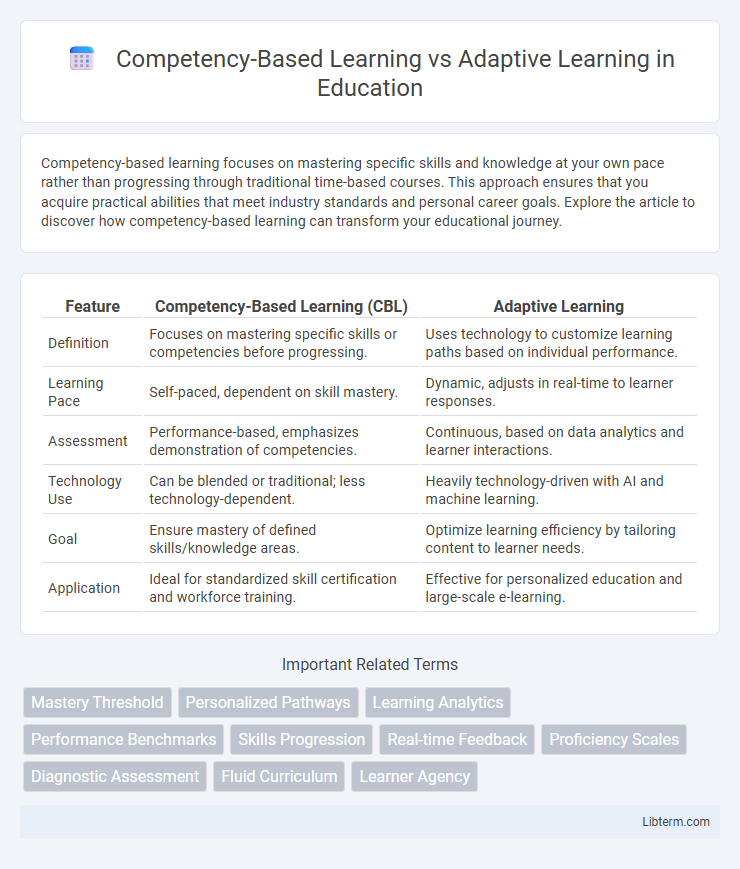Competency-based learning focuses on mastering specific skills and knowledge at your own pace rather than progressing through traditional time-based courses. This approach ensures that you acquire practical abilities that meet industry standards and personal career goals. Explore the article to discover how competency-based learning can transform your educational journey.
Table of Comparison
| Feature | Competency-Based Learning (CBL) | Adaptive Learning |
|---|---|---|
| Definition | Focuses on mastering specific skills or competencies before progressing. | Uses technology to customize learning paths based on individual performance. |
| Learning Pace | Self-paced, dependent on skill mastery. | Dynamic, adjusts in real-time to learner responses. |
| Assessment | Performance-based, emphasizes demonstration of competencies. | Continuous, based on data analytics and learner interactions. |
| Technology Use | Can be blended or traditional; less technology-dependent. | Heavily technology-driven with AI and machine learning. |
| Goal | Ensure mastery of defined skills/knowledge areas. | Optimize learning efficiency by tailoring content to learner needs. |
| Application | Ideal for standardized skill certification and workforce training. | Effective for personalized education and large-scale e-learning. |
Understanding Competency-Based Learning
Competency-Based Learning (CBL) emphasizes mastery of specific skills and knowledge, allowing learners to progress at their own pace until they demonstrate full understanding. This model prioritizes clear learning outcomes and personalized assessment criteria tailored to individual competencies. CBL contrasts with Adaptive Learning by focusing less on real-time content adjustments and more on achieving measurable proficiency benchmarks.
Defining Adaptive Learning
Adaptive learning customizes educational experiences by using real-time data and algorithms to adjust content, pacing, and feedback to meet individual student needs. It dynamically responds to each learner's performance, ensuring personalized progression through materials that target specific strengths and weaknesses. This learner-centered approach contrasts with competency-based learning, which emphasizes mastery of predefined skills and knowledge units before advancing.
Core Principles of Competency-Based Learning
Competency-Based Learning centers on mastery of specific skills and knowledge, allowing students to progress upon demonstrating proficiency rather than time spent. It emphasizes personalized pacing, clear learning outcomes, and assessment aligned with real-world competencies. This approach contrasts with Adaptive Learning, which uses technology to customize content delivery based on student responses without necessarily requiring demonstrated competency for advancement.
How Adaptive Learning Personalizes Education
Adaptive learning personalizes education by continuously analyzing student performance data to tailor instructional content and pacing to individual needs. It employs algorithms and real-time feedback to adjust difficulty levels, learning paths, and resources, enhancing engagement and mastery. This dynamic approach contrasts with competency-based learning, which emphasizes progression upon demonstrated skills but may lack real-time customization.
Key Differences Between Competency-Based and Adaptive Learning
Competency-Based Learning emphasizes mastery of specific skills or knowledge with progression based on demonstrated competence, while Adaptive Learning customizes the learning experience dynamically using data-driven algorithms to adjust content and pace to individual learner needs. Competency-Based Learning typically features clearly defined learning objectives and assessments to ensure each learner attains proficiency before advancing, whereas Adaptive Learning relies on real-time feedback to tailor instructional paths and optimize learning efficiency. The key difference lies in Competency-Based Learning's fixed mastery criteria versus Adaptive Learning's flexible, personalized adaptation to learner performance and preferences.
Benefits of Competency-Based Learning
Competency-Based Learning (CBL) offers personalized pacing, allowing learners to master specific skills before advancing, which enhances knowledge retention and practical application. This approach supports targeted skill development aligned with industry standards, ensuring learners gain relevant competencies for career readiness. CBL promotes learner autonomy and motivation by emphasizing mastery over time spent, resulting in improved engagement and measurable outcomes.
Advantages of Adaptive Learning Technologies
Adaptive learning technologies leverage real-time data and machine learning algorithms to tailor educational content to individual student needs, enhancing personalized learning experiences. These technologies provide immediate feedback and dynamically adjust difficulty levels, increasing student engagement and improving retention rates. Adaptive learning systems also enable educators to identify knowledge gaps quickly, facilitating targeted interventions that support mastery of concepts more efficiently than traditional competency-based approaches.
Implementation Challenges for Both Learning Models
Competency-Based Learning faces implementation challenges such as aligning curriculum standards with individual learner mastery levels and developing reliable assessment methods to measure competencies effectively. Adaptive Learning systems struggle with integrating complex algorithms that accurately personalize content while ensuring data privacy and managing the high costs of technology infrastructure. Both models require extensive professional development for educators to effectively utilize new tools and strategies, alongside institutional support to overcome resistance to change.
Choosing the Right Model for Your Educational Goals
Competency-Based Learning emphasizes mastery of specific skills and knowledge at an individualized pace, ideal for programs prioritizing clear skill benchmarks and learner accountability. Adaptive Learning leverages technology to customize content dynamically based on ongoing student performance, making it suitable for environments requiring real-time personalization and engagement. Selecting the right model depends on whether your educational goals focus on skill certification and mastery (competency-based) or continuous, data-driven content adjustment (adaptive learning).
Future Trends in Education: Blending Competency-Based and Adaptive Learning
Future trends in education emphasize the integration of competency-based learning and adaptive learning to create personalized, mastery-focused pathways that address individual student needs. Competency-based frameworks define clear skill milestones while adaptive technologies tailor content and assessments in real-time, enhancing engagement and efficiency. This blended approach leverages data analytics and AI to optimize learning outcomes and promote lifelong skill development in diverse educational settings.
Competency-Based Learning Infographic

 libterm.com
libterm.com